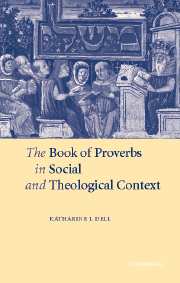Book contents
- Frontmatter
- Contents
- Preface
- List of Abbreviations
- Introduction
- 1 Social context(s) in Proverbs 1–9
- 2 Social context(s) in Proverbs 10:1—22:16
- 3 Social context(s) in Proverbs 22:17—31:31
- 4 Mention of Yahweh in Proverbs
- 5 Theological context
- 6 Echoes of other Old Testament texts and contexts in Proverbs
- Conclusion
- Bibliography
- Index
- References
Bibliography
Published online by Cambridge University Press: 22 September 2009
- Frontmatter
- Contents
- Preface
- List of Abbreviations
- Introduction
- 1 Social context(s) in Proverbs 1–9
- 2 Social context(s) in Proverbs 10:1—22:16
- 3 Social context(s) in Proverbs 22:17—31:31
- 4 Mention of Yahweh in Proverbs
- 5 Theological context
- 6 Echoes of other Old Testament texts and contexts in Proverbs
- Conclusion
- Bibliography
- Index
- References
- Type
- Chapter
- Information
- The Book of Proverbs in Social and Theological Context , pp. 201 - 220Publisher: Cambridge University PressPrint publication year: 2006



